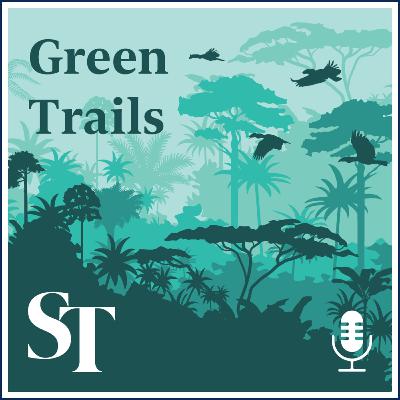Discover Green Trails
Green Trails

Green Trails
Author: The Straits Times
Subscribed: 1Played: 0Subscribe
Share
© 2026 The Straits Times
Description
Synopsis (headphones recommended): In this new 4-part environment podcast series for 2024 - Green Trails - The Straits Times hits the ground with experts in spaces that are critical to the interlinked crises the planet faces: climate change, pollution, and biodiversity loss.
Podcasters: Ang Qing & Shabana Begum
Produced and edited by: Hadyu Rahim
Executive producers: Ernest Luis & Lynda Hong
A podcast by The Straits Times, SPH Media.
6 Episodes
Reverse
Starting with Punggol, The Straits Times looks at how a city in nature can co-exist with wildlife. Synopsis: Every first and third Tuesday of the month, The Straits Times analyses the beat of the changing environment, from biodiversity conservation to climate change. In recent months, a globally endangered monkey has unsettled Singapore’s youngest housing estate Punggol, with dozens of reports made against long-tailed macaques for entering human homes. In turn, the authorities have responded to the wild monkeys, which are not considered threatened in the Republic, with an arsenal of measures that range from sterilisation to pelting them with water gel guns, a move that made headlines in August. Following ST’s award-winning Green Trails podcast, co-hosts Ang Qing and Shabana Begum return to discuss human-wildlife coexistence in Singapore with Mr Kalaivanan Balakrishnan, chief executive of the Animal Concerns Research and Education Society (Acres) and Ms Jasvic Lye, campaign manager of Our Wild Neighbours, an outreach initiative. Find out more about how solutions to manage urban wildlife – and people’s acceptance of the animals – can be improved. This episode was recorded and filmed last month in front of an intimate live audience of 95 people who packed The Fashion Pulpit in Jalan Besar. The evening was part of the ST Podcast Live! Sessions celebrating 180 years of The Straits Times. Highlights of conversation (click/tap above): 1:12 Gaps in Singapore’s approach to human-wildlife conflict 10:16 Biggest challenges when managing conflict 14:25 Common myths about wildlife that Singaporeans buy into 18:10 How wildlife can guide city planning 22:45 What young people can do to better manage human-wildlife encounters How we can beat the heat in Singapore: https://str.sg/952d More on Our Wild Neighbours: https://str.sg/K8Jw More on Animal Concerns Research & Education Society (Acres): https://str.sg/F6c6 Discover ST’s award-winning Green Trails series: https://str.sg/rL6r Follow Ang Qing on LinkedIn: https://str.sg/ichp Read her articles: https://str.sg/i5gT Follow Shabana Begum on LinkedIn: https://str.sg/83Ge Read her articles: https://str.sg/5EGd Hosts: Ang Qing (aqing@sph.com.sg) & Shabana Begum (nshab@sph.com.sg) Produced and edited by: Amirul Karim Executive producers: Ernest Luis & Lynda Hong Follow Green Pulse Podcast here and get notified for new episode drops: Channel: https://str.sg/JWaf Apple Podcasts: https://str.sg/JWaY Spotify: https://str.sg/JWag Feedback to: podcast@sph.com.sg SPH Awedio app: https://www.awedio.sg --- Follow more ST podcast channels: All-in-one ST Podcasts channel: https://str.sg/wvz7 Get more updates: http://str.sg/stpodcasts The Usual Place Podcast YouTube: https://str.sg/4Vwsa --- Get The Straits Times app, which has a dedicated podcast player section: The App Store: https://str.sg/icyB Google Play: https://str.sg/icyX #greenpulseSee omnystudio.com/listener for privacy information.
While Singapore is transforming into a City in Nature, natural habitats have been lost to development, leading to more human and animal clashes. How can wildlife and humans live in harmony? Synopsis (headphones recommended): Green Trails is a four-part environment podcast special for 2024 where The Straits Times hits the ground with experts. In this fourth episode, our trails won’t be entirely green. Instead of a nature park or a green space, we head over to an urban place surrounded by buildings and construction noise. The new neighbourhood of Punggol Northshore recently saw some monkey business, with troops of long-tailed macaques spotted at construction sites and even eating at a void deck of an HDB block. To find out how residents can responsibly live in a macaque hotspot, ST journalist Shabana Begum speaks with co-chief executive of Animal Concerns Research and Education Society (Acres) Anbarasi Boopal, and president of the Jane Goodall Institute (Singapore) Andie Ang. Strolling along Punggol Settlement and the promenade opposite Coney Island, the conversation turns to other wildlife in our midst – from the common palm civets that tend to sneak into private houses, to the ever-present junglefowls. Animals in urban areas being culled is never a clear-cut decision, as Ms Anbarasi says: “Removal (of animals) is always not a solution. And where do we draw the line, right? “We are okay with hornbills, but we're not okay with other birds.” Highlights (click/tap above): 2:10 Why is Punggol a monkey hotspot? 4:45 Monkey see, monkey don’t do 11:08 When otters and civets visit homes 14:30 Is culling the best way to reduce bird numbers? 17:08 What to do when you encounter a snake Read ST’s previous commentary about co-existing with wildlife: https://str.sg/tYpq Find out more about macaques in Punggol: https://str.sg/ephc Listen to other Green Trails episodes: Ep 1: Visit to Sungei Buloh: How Singapore can better host migratory birds - https://str.sg/BrqS Ep 2: Visit to East Coast: How reclamation will shape up against rising sea levels - https://str.sg/mRG8 Ep 3: Visit to Windsor Park: Can insects in SG's backyard be foraged? - https://str.sg/4V6nQ Host: Shabana Begum (nshab@sph.com.sg) Trail producers: Hadyu Rahim, Fa‘izah Sani, Amirul Karim & Elsa Goh Edited by: Hadyu Rahim Executive Producers: Lynda Hong (lyndahong@sph.com.sg), Ernest Luis (ernest@sph.com.sg) & Audrey Tan (audreyt@sph.com.sg) Follow Green Pulse Podcast here and get notified for new episode drops: Channel: https://str.sg/JWaf Apple Podcasts: https://str.sg/JWaY Spotify: https://str.sg/JWag Feedback to: podcast@sph.com.sg --- Follow more ST podcast channels: All-in-one ST Podcasts channel: https://str.sg/wvz7 ST Podcasts website: http://str.sg/stpodcasts The Usual Place Podcast YouTube: https://str.sg/4Vwsa --- Get The Straits Times app, which has a dedicated podcast player section: The App Store: https://str.sg/icyB Google Play: https://str.sg/icyX --- #greenpulse #greentrailsSee omnystudio.com/listener for privacy information.
Love or loathe them, could insects also become a food source in the wider context of the global population? Synopsis (headphones recommended): Green Trails is a 4-part environment podcast special for 2024 where The Straits Times hits the ground with experts. "Can this be eaten?” is an oft repeated question that every nature guide is familiar with. In July, Singapore approved 16 species of insects for human consumption, to the delight of sustainable food firms and disgust of some Singaporeans. But can bugs one day whet mainstream appetites like sambal stingray, a smokey South-east Asian dish crafted from the creature once considered as a “trash fish”? In this third episode of Green Trails, our team speaks to members of the Entomological Network of Singapore, a group of insect researchers and hobbyists, about the stories of insects in the city-state and whether these creatures can be foraged. At Windsor Nature Park, ST journalist Ang Qing meets Dr Sean Yap, a research fellow at Nanyang Technological University’s Tropical Ecology & Entomology Lab, Mr Foo Maosheng, a senior scientific officer at the National University of Singapore’s Lee Kong Chian Natural History Museum, and entomological educator and consultant James Khoo. For almost two hours, they go on a trail while discussing everything related to insects - from Singapore's historical link to beetle science, to how pretty privilege shapes research in the insect kingdom. Highlights (click/tap above): 5:41 Singapore's historical role in beetle science 11:18 Debunking the myth about cockroaches 15:38 How insect as food can gain popularity akin to seafood like sambal stingray 17:53 The tastiest insects and can we forage for them 22:10 Sharing our home with insects Read Ang Qing’s previous article about a cockroach discovery in Singapore: https://str.sg/ikhv Listen to other Green Trails episodes: Ep 1: Visit to Sungei Buloh: How Singapore can better host migratory birds - https://str.sg/BrqS Ep 2: Visit to East Coast: How reclamation will shape up against rising sea levels - https://str.sg/mRG8 Follow Ang Qing on LinkedIn: https://str.sg/ichp Read her articles: https://str.sg/i5gT Host: Ang Qing (aqing@sph.com.sg) Trail producers: Hadyu Rahim, Fa’izah Sani, Amirul Karim & Hana Chen Edited by: Hadyu Rahim Executive Producers: Lynda Hong (lyndahong@sph.com.sg), Ernest Luis (ernest@sph.com.sg) & Audrey Tan (audreyt@sph.com.sg) Follow Green Pulse Podcast here and get notified for new episode drops: Channel: https://str.sg/JWaf Apple Podcasts: https://str.sg/JWaY Spotify: https://str.sg/JWag Feedback to: podcast@sph.com.sg --- Follow more ST podcast channels: All-in-one ST Podcasts channel: https://str.sg/wvz7 ST Podcasts website: http://str.sg/stpodcasts The Usual Place Podcast YouTube: https://str.sg/4Vwsa --- Get The Straits Times app, which has a dedicated podcast player section: The App Store: https://str.sg/icyB Google Play: https://str.sg/icyX --- #greenpulse #greentrailsSee omnystudio.com/listener for privacy information.
While the future Long Island will guard against sea level rise, the trade-offs to marine life and the East Coast’s character must be addressed, stakeholders say. Synopsis (headphones recommended): Green Trails is a 4-part environment podcast special for 2024 where The Straits Times hits the ground with experts. The next episode drops in August. By end-century, Singapore’s mean sea level is expected to rise by up to 1.15m. Now a top attraction in the area, East Coast Park would be a place to avoid if nothing is done. Frequent floods are likely to put the beach underwater in the future, as climate change continues to exacerbate rising sea levels. And if exceptionally high tides or storm surges were to hit, seawater levels could rise up to 5m, breaking through the coast. The entire park, East Coast Parkway, vehicles and void decks at housing estates like Marine Parade in the vicinity could be submerged in water. To prevent this reality, there are plans to have a defence offshore. That is Long Island, twice the size of Marina Bay reclaimed off the east coast, with a reservoir in between. As the June 14 oil spill has shown, human activity - if not managed properly - can threaten coastal and marine habitats, including the biodiversity-rich Southern Islands. In this second episode of Green Trails, our team heads to East Coast Park and a lesser known habitat near Marina Barrage - important to threatened species and likely to be threatened by reclamation - to find answers. At the heart of East Coast Park, ST journalist Shabana Begum meets with representatives from the Urban Redevelopment Authority (URA) and National Water Agency PUB - Mr Lee Wai Kin and Mr Thoo Jung Chee. Both agencies are spearheading the Long Island project. At the little-known Marina East Drive habitat, Shabana uncovers the wildlife there when she takes a walk with Mr Lester Tan, who chairs Nature Society (Singapore)’s Marine Conservation Group. In the evening, Shabana returns to East Coast Park to speak with Mr Maximus Tan, 22 and Mr Crispus Tan, 27. These youths - who will live to see Long Island taking shape in the next few decades - voice their aspirations for Long Island. Highlights (click/tap above): 2:43 What will happen to East Coast if nothing is done to protect the shoreline? 4:00 How will Long Island defend Singapore from rising sea levels? 11:07 How will the authorities minimise the impact of reclamation on marine life? 16:13 What are the lesser-known biodiversity havens of the East Coast? 22:04 Lester on whether marine life along East Coast will eventually return post-reclamation 26:22 Reactions from Crispus and Maximus on East Coast's changing landscape 32:53 Crispus and Maximus on life on Long Island, their hopes and ideas Read about Singapore's Long Island plan: https://str.sg/ixC7 More on the mega project here: https://str.sg/6zoP Listen to other Green Trails episodes: Ep 1: Visit to Sungei Buloh: How Singapore can better host migratory birds - https://str.sg/BrqS Ep 3: Visit to Windsor Nature Park: Can insects in SG's backyard be foraged https://omny.fm/shows/green-pulse-1/visit-to-windsor-nature-park-how-big-of-a-role-can Host: Shabana Begum (nshab@sph.com.sg) Trail producers: Lynda Hong, Hadyu Rahim, Teo Tong Kai, Eden Soh Edited by: Hadyu Rahim Executive Producers: Ernest Luis (ernest@sph.com.sg) & Audrey Tan (audreyt@sph.com.sg) Follow Shabana on LinkedIn: https://str.sg/FEid Read her articles: https://str.sg/5EGd Follow Green Pulse Podcast here and get notified for new episode drops: Channel: https://str.sg/JWaf Apple Podcasts: https://str.sg/JWaY Spotify: https://str.sg/JWag Feedback to: podcast@sph.com.sg --- Follow more ST podcast channels: All-in-one ST Podcasts channel: https://str.sg/wvz7 ST Podcasts website: http://str.sg/stpodcasts The Usual Place Podcast YouTube: https://str.sg/4Vwsa --- Get The Straits Times app, which has a dedicated podcast player section: The App Store: https://str.sg/icyB Google Play: https://str.sg/icyX --- #greenpulse #greentrailsSee omnystudio.com/listener for privacy information.
Why mudflats are vital for dwindling numbers of birds that stop over seasonally. Synopsis (headphones recommended): In this new 4-part environment podcast series for 2024 - Green Trails - The Straits Times hits the ground with experts in spaces that are critical to the interlinked crises the planet faces: climate change, pollution, and biodiversity loss. The next episode drops in June. For this inaugural episode, our team heads to Sungei Buloh Wetland Reserve, the local haven for birds that travel across the world to refuel at. Nature Society (Singapore) - one of the island's oldest non-governmental organisations - convinced the government to preserve Sungei Buloh as a wetland reserve by showing officials the diversity of birds that depend on the spot. ST journalist Ang Qing takes a walk with representatives from the society - Veronica Foo and Tan Gim Cheong. They talk about the lesser-known Mandai Mangrove and Mudflat, which is key to supporting the thousands of migratory shorebirds that stop over in Singapore between August and March, and why it should also receive full protection from the law. Highlights (click/tap above): 2:30 Why is Sungei Buloh Wetland Reserve so special? 7:01 Have there been fewer shorebirds at the reserve? 11:15 What kind of man-made features threaten migratory birds? 18:00 Why a lesser known mudflat needs to get stronger legal protection Read an earlier article on migratory birds: https://str.sg/JtYUU Discover the Nature Society (Singapore) Bird Group: https://str.sg/wNzGa Read also: Green Trails Podcast: Experience Singapore’s spaces through sound - https://str.sg/qcCm Listen to other Green Trails episodes: Ep 2: Visit to East Coast: How reclamation will shape up against rising sea levels - https://str.sg/mRG8 Ep 3: Visit to Windsor Nature Park: Can insects in SG's backyard be foraged https://omny.fm/shows/green-pulse-1/visit-to-windsor-nature-park-how-big-of-a-role-can Host: Ang Qing (aqing@sph.com.sg) Trail producers: Lynda Hong, Hadyu Rahim, Teo Tong Kai, Amirul Karim, Eden Soh Edited by: Hadyu Rahim Executive Producers: Ernest Luis (ernest@sph.com.sg) & Audrey Tan (audreyt@sph.com.sg) Follow Green Pulse Podcast here and get notified for new episode drops: Channel: https://str.sg/JWaf Apple Podcasts: https://str.sg/JWaY Spotify: https://str.sg/JWag Feedback to: podcast@sph.com.sg --- Follow more ST podcast channels: All-in-one ST Podcasts channel: https://str.sg/wvz7 ST Podcasts website: http://str.sg/stpodcasts The Usual Place Podcast YouTube: https://str.sg/4Vwsa --- Get The Straits Times app, which has a dedicated podcast player section: The App Store: https://str.sg/icyB Google Play: https://str.sg/icyX --- #greenpulse #greentrailsSee omnystudio.com/listener for privacy information.
Why non-native species like the golden-backed weaver and monk parakeet need to be dealt with before they spread elsewhere. Synopsis (headphones recommended): In our first audio trail of Singapore’s nature spaces, The Straits Times explores the ins and outs of creatures in these places with those who know them well. Listen to birdsong at the Kranji Marshes with the president and vice-president of freshly hatched conservation group Bird Society of Singapore Keita Sin and Movin Nyanasengeran who take ST journalist Ang Qing around one of the largest freshwater marshes here. During a two-hour walk, they experience a morning at the remote park, which is home to more than 170 birds in north-western Singapore. They banter on all things bird-related, from ‘parrot politics’ to the mounting threat of invasive bird species to Singapore and South-east Asia. This comes as the Intergovernmental Science-Policy Platform on Biodiversity and Ecosystem Services reported in September that more than 3,500 harmful invasive species have cost the global economy at least US$423 billion (S$576 billion) a year. And the annual expense has quadrupled every decade since the 1970s. You can also read our accompanying ST podcast article to see pictures of the various bird species mentioned (link below). Highlights (click/tap above): 1:49 The tale of the golden-backed weaver and what it means for Singapore 6:47 Parrot pet problems and ‘politics’ 8:55 What you need to know about Kranji Marshes 9:25 The origins and ambitions of Bird Society of Singapore 15:55 Debunking common myths about birds To see the various bird species named in this podcast, read our podcast article: https://str.sg/ichq Produced by: Ang Qing (aqing@sph.com.sg), Ernest Luis, Hadyu Rahim, Teo Tong Kai & Paxton Pang Edited by: Hadyu Rahim Discover The Bird Society of Singapore: https://str.sg/ichc Follow Green Pulse Podcast channel here and rate us: Channel: https://str.sg/JWaf Apple Podcasts: https://str.sg/JWaY Spotify: https://str.sg/JWag Website: http://str.sg/stpodcasts Feedback to: podcast@sph.com.sg Follow Ang Qing on LinkedIn: https://str.sg/ichp Read her articles: https://str.sg/i5gT --- Follow more ST podcast channels: All-in-one ST Podcasts channel: https://str.sg/wvz7 ST Podcasts website: http://str.sg/stpodcasts The Usual Place Podcast YouTube: https://str.sg/4Vwsa --- Get The Straits Times app, which has a dedicated podcast player section: The App Store: https://str.sg/icyB Google Play: https://str.sg/icyX Follow our shows then, if you like short, practical podcasts! #greenpulse #greentrailsSee omnystudio.com/listener for privacy information.








